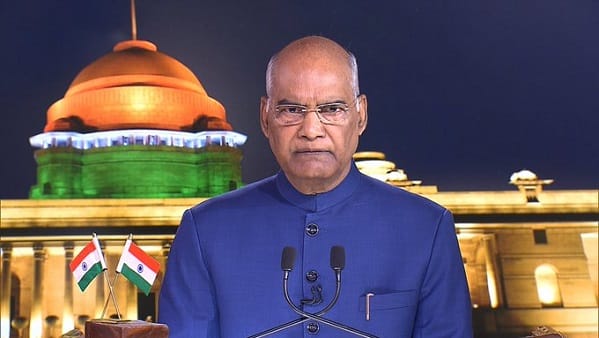Last Updated on July 25, 2022 1:16 pm by INDIAN AWAAZ

Andalib Akhter
AMN / NEW DELHI
Ram Nath Kovind India’s 14th President completed his term on Sunday, and his successor, Droupadi Murmu sworn in on Monday. In his customary Farewell address on the eve of demitting office, Mr Kovind said that in his five-year term, he had discharged his responsibilities to the best of his abilities, he had tried hard to be a worthy successor to great presidents like Rajendra Prasad, S. Radhakrishnan and A.P.J. Abdul Kalam. “My predecessor, Shri Pranab Mukherjee, also shared his wise counsel with me,” he said, adding however, that whenever he did feel that he needed to think over a certain path of action, he remembered Mahatma Gandhi’s talisman which enjoined that whenever in doubt over a course of action, one need only to ask whether this action would help the poorest person around.
The President said that people from all walks of life including farmers and workers from small villages, teachers, artists, doctors and nurses, judges, and advocates have helped him in discharging his duties. Mr Kovind said he will cherish the occasions when he met brave jawans of the armed forces, para-military forces, and the police. In concluding his address, he asked everyone to take care of the environment, land, air, and water, for the sake of the children.
Mr Kovind assured that India’s great future is secured with each of its citizens striving to make India better and better. He said the nation will celebrate the 75th anniversary of Independence in August and enter the ‘Amrit Kaal’, the 25-year period leading to the centenary of Independence. He emphasized that these anniversaries are milestones on the journey of the Republic, and a journey to discover its potential and to offer its best to the world.
Mr Kovind said that when Mahatma Gandhi returned to India in 1915, the nationalist fervour was gaining momentum. He expressed the belief that no other country has been as fortunate as India is having a galaxy of leaders with exceptional minds, within a span of a few decades in the early twentieth century. He mentioned Gurudev Rabindranath Tagore who helped people find their cultural roots again and Babasaheb Bhimrao Ambedkar who advocated the cause of equality that was unheard of in most advanced countries. The President highlighted that from Tilak and Gokhale to Bhagat Singh and Netaji, from Jawaharlal Nehru, Sardar Patel, and Shyama Prasad Mukherjee to Sarojini Naidu and Kamaladevi Chattopadhyay – great minds came together for a common cause. He said this has not happened anywhere else. He lauded Gandhiji for being the one whose transformative ideas influenced the outcome the most.
Mr Kovind emphasized that the formal map for the democratic path of the nation was drafted by the Constituent Assembly. It included great minds from across the country, including 15 remarkable women such as Hansaben Mehta, Durgabai Deshmukh, Rajkumari Amrit Kaur, and Sucheta Kripalani. The President said that the Constitution they prepared has been country’s guiding beacon and values enshrined in it have been part of the Indian ethos. Mr Kovind mentioned that Dr Ambedkar had pointed out the distinction between two kinds of democracy in his concluding remarks in the Constituent Assembly before the Constitution was adopted. Dr Ambedkar had said people must not be content with mere political democracy. Mr Kovind quoted Dr Ambedkar saying political democracy cannot last unless social democracy lies at the base of it. It means a way of life that recognizes liberty, equality, and fraternity as the principles of life.
Mr Kovind stressed that India’s ancestors and founders exemplified the meaning of justice, liberty, equality and fraternity with hard work and an attitude of service. He said the nation must follow in their footsteps and keep walking. The President highlighted that the chief goal is to help citizens discover the joy of living, for which their basic necessities must be taken care of. He said government is to provide better housing and access to drinking water and electricity for every family. He said this change has been made possible by development and good governance which knows no discrimination. He emphasized that National Education Policy will go a long way in making young Indians connect with their heritage and also find their feet in the twenty-first century. Speaking about healthcare, the President said COVID pandemic has underlined the need to further improve the public healthcare infrastructure. He expressed happiness that the Government has accorded top priority to this task. He said economic reforms will let citizens find the best course for their lives once education and healthcare are in place.
Recounting his childhood days, Mr Kovind said India had only recently achieved independence when he was growing up. He said that a young boy living in a mud house could not have any idea about the highest Constitutional office of the Republic. He said it is thanks to the power of nation’s vibrant democratic institutions that Ram Nath Kovind from village Paraunkh could become the President. He said that visiting his home during his term and touching the feet of his teachers at Kanpur to seek their blessings has been a memorable experience. This year, the Prime Minister also honoured Mr Kovind’s village Paraunkh with his visit. Saying that this connection with roots has been the essence of India, Mr Kovind requested the younger generation to continue this tradition of staying connected with their villages and towns, schools, and teachers.
